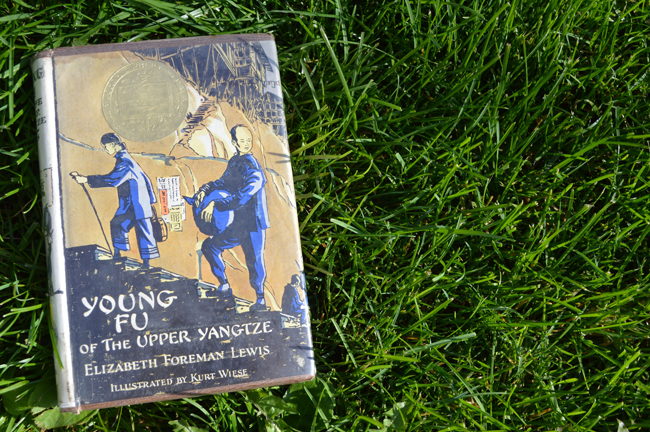I was surprised by how much I liked the 1933 Newbery winner Young Fu of the Upper Yangtze by Elizabeth Foreman Lewis. A Bildungsroman, or coming-of-age novel, the book follows Young Fu through his coppersmith apprenticeship in 1920s Chungking, China. Following the death of his father, Young Fu and his mother Fu Be Be move from the country into the populated, wonderful and dangerous city. I read an older version, but the 75th anniversary edition has an introduction by Katherine Paterson who was born a decade later a hundred miles upstream on the Yangtze herself, and she writes that it’s a lovely book that reminds her of the stories that she grew up hearing from her parents about the 1920s. So I am in good company thinking the book “was and is a really good read.” (P. Viii)
What I liked. My favorite part of the book was the coppersmith master, Tang. He is wise and fair with all his employees. The most poignant scenes are when Young Fu confesses a shameful mistake to Tang expecting judgment (and perhaps an ending of the apprenticeship) and instead receives Tang’s mercy. I thought the picture of Tang as a patient and loving father figure was really a beautiful part of the story, matched only by Fu’s gratitude and growth. The ending (spoiler alert) when Tang asked Fu to become his adopted son was one of the most satisfying endings of any of the Newberies I’ve read so far.
What was interesting. A turbulent time period in China, the 1920s, with its fighting warlords and beginning rumblings of the Nationalist and Communist movements, was a fascinating backdrop, and one that I knew little of before reading this book. The author herself was a Methodist missionary there, and I imagine that her yellow-haired missionary in the story perhaps was autobiographical. This is the second time in the early Newbery books that we’ve run into late nineteenth century and early twentieth century American missionaries in Asia (Hitty spends some time with Missionaries to India). The Western missionaries do come across as uniformly positive in this account, un-superstitious and progressively modern in medical treatment, stances with which the two main characters Fu and Tang agree, while other characters (perhaps in a slightly stereotypical way) do not.
What were some limitations. Sometimes the chapters could be somewhat episodic, and Young Fu seemed to be a little slow to learn some of his lessons. Occasionally, Lewis’ commentary interrupted the narrative, such as when she spends several pages explaining opium. But overall, I thought these issues didn’t overly detract from what I liked about the novel.
Why I think it’s a Newbery / Similarity to other Newbery winners. Again, we see a Newbery with an exotic Asian setting (like The Cat Who Went to Heaven, Gay-Neck, Shen of the Sea) and like last week’s we have a coming-of-age novel (like Dark Frigate, Waterless Mountain, Trumpeter of Krakow). I think that we’re going to see more Newberies like Young Fu that feature young people with mentors who guide them and who use their wits to come up with surprising solutions to the scrapes they get themselves into. (For example, when Young Fu gets conned into buying a watch for an exorbitant price on credit, he manages to pay his debtors by selling snow (dragon’s breath) on New Year’s Day for good luck.)
What it teaches me as a writer. Of course, since I’m writing about dragons, I loved all the different elemental dragons in the book—snow as dragon’s breath, and dragon’s fire. But thematically, I really felt that Lewis was able to have us as readers really feel Fu’s shame and receive the mercy and relief when he was able to confess to his mother and Tang what happened. Fu’s wrongdoings were fairly typical growing up mistakes, but Lewis was able to cathartically bring us through the pride, fall, anxiety, guilt, shame, confession, relief, and freedom of confessing a sin and receiving mercy and forgiveness for it.
Have you read Young Fu of the Upper Yangtze? What are your favorite coming-of-age novels?






